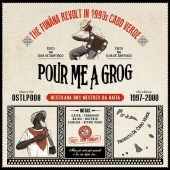
Various Artists
Pour Me A Grog: The Funana Revolt In 1990s Cabo Verde
Label: Ostinato
Genre: World Music
Availability
- LP €23.99 Out of Stock
Returning home, they slowly formed an elite class of self-taught gaita players. The gaita became the maximum expression of Badiu identity, one defined over centuries by a persistent culture of revolt and rebellion against domination and injustice. In a land lacking electricity, the acoustic instrument is king.
Mastery of a hard-won instrument gave birth to raw Funaná music, undoubtedly a sibling of Cumbia. Hypnotic notes on aged accordions tuned and flavored in ways found nowhere but Santiago infused with inviting baselines, raucous rhythms, blade-on-iron percussion, and the bubbling lyricism and lament of the island’s finest ambassadors.
Their music was outlawed under colonial rule, with strict curfews to prevent large, potentially subversive gatherings since Funaná was dance music meant for large crowds, centered on one of the many star gaiteiros. Yet, naturally defiant, Badiu Funaná continued unfazed at the risk of arrest and detention. Funaná remained an isolated style, largely an affair for Badiu ears only. But in 1991, Cabo Verde had its first democratic election. Elections are tricky business anywhere, let alone a country divided into several islands, each needing a tailored approach. Political parties found a novel solution to successfully get their campaign messages out to large audiences with ears wide open: music festivals. Till today, Cabo Verde plays host to dozens of festivals a year, some sponsored by the government.
The music of the proud African interior became the soundtrack of choice at campaign rallies. It drew large crowds, engaged the youth, kept people content, and undoubtedly won votes, setting the stage for traditional Funaná’s entry into the mainstream, catching the attention of successful Cabo Verdean record label bosses living in Europe.
This compilation distills eight tracks from a short period in the late ‘90s when cherished pioneers, who risked everything give their proud culture a sound, got their one chance in a recording studio.
Pour yourself a grog, Cabo Verde’s local moonshine made from sugarcane crushed by bulls, imbibe responsibly, listen carefully, and dance recklessly.
